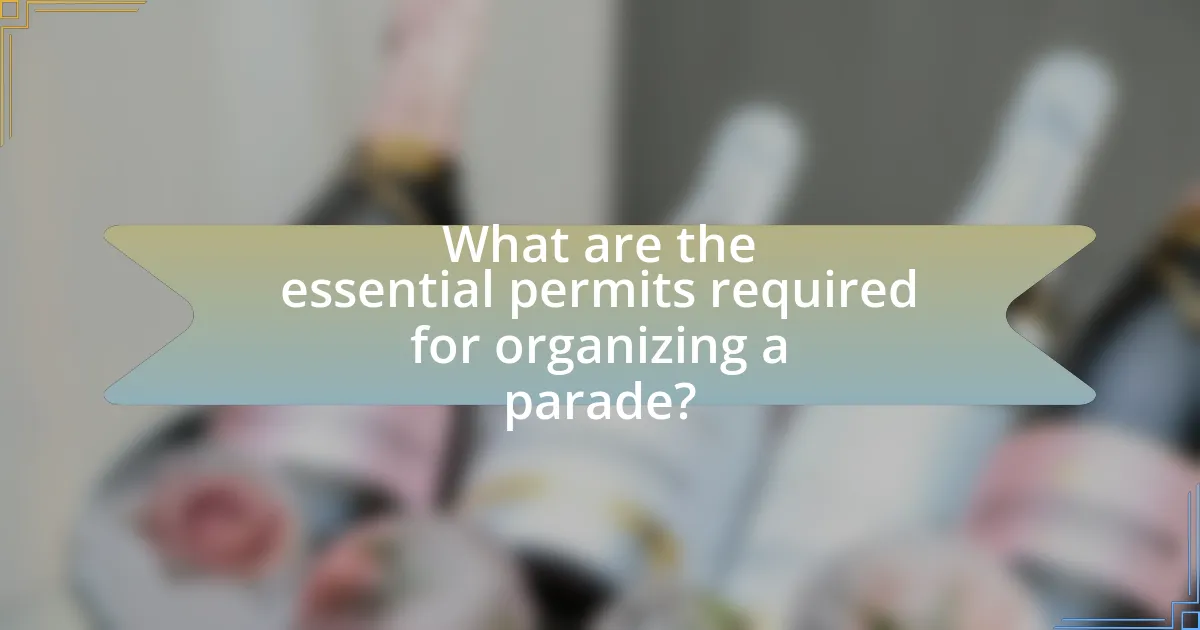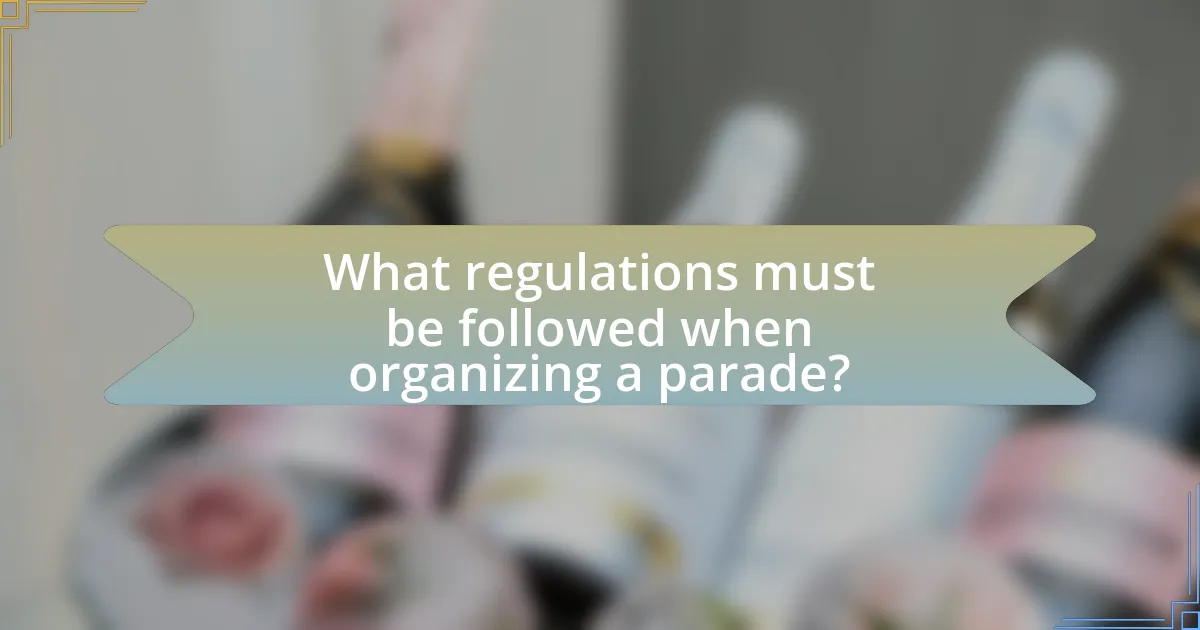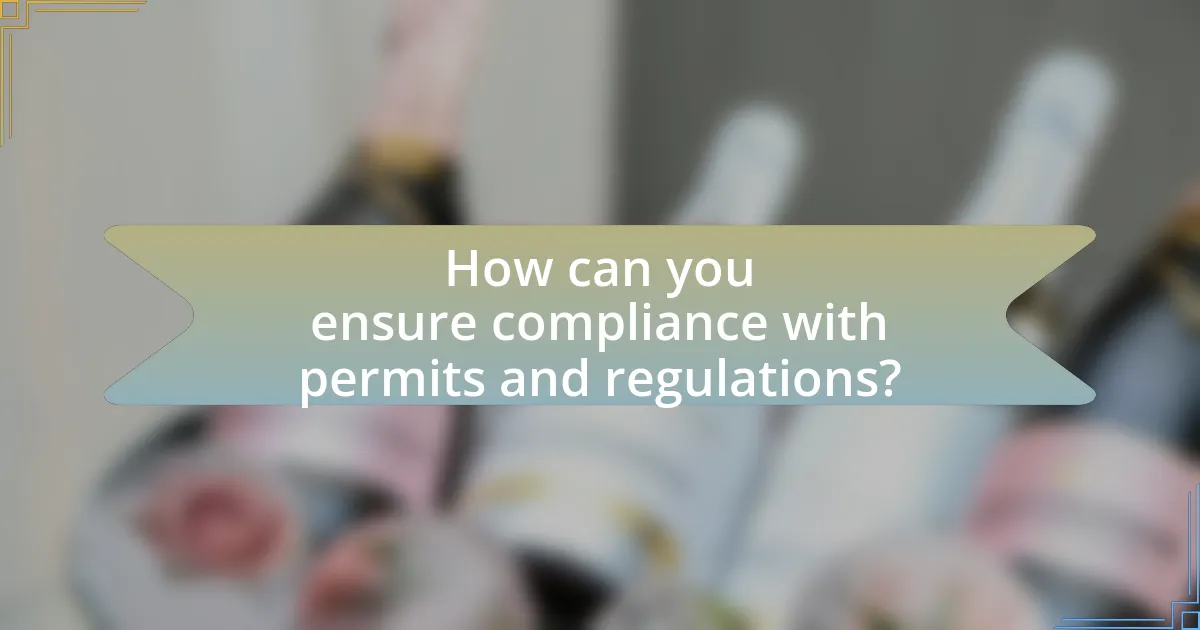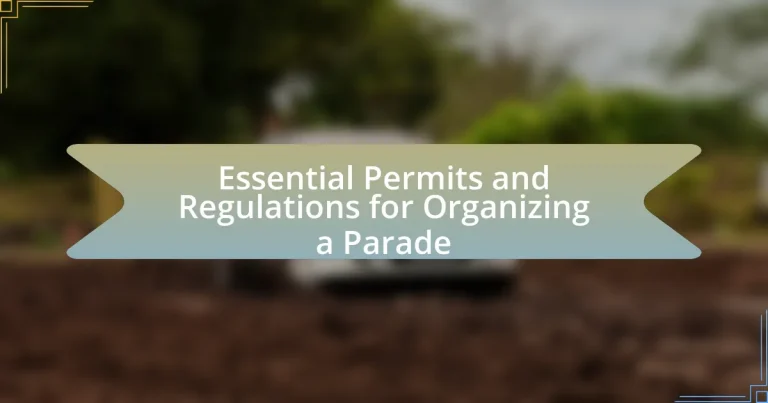The article focuses on the essential permits and regulations required for organizing a parade. It outlines the necessary permits, such as parade permits, street closure permits, and sound permits, emphasizing the importance of compliance with local government regulations to ensure public safety and avoid legal penalties. The article also discusses how to determine which permits are needed, factors influencing permit requirements, and the consequences of failing to obtain them. Additionally, it provides guidance on effective communication with local authorities, best practices for navigating the permit application process, and strategies to address unexpected regulatory challenges.

What are the essential permits required for organizing a parade?
The essential permits required for organizing a parade typically include a parade permit from the local government, which ensures compliance with public safety regulations and traffic management. Additionally, organizers may need to secure permits for street closures, sound permits for amplified music, and liability insurance to cover potential damages or injuries. These permits are crucial as they help maintain order and safety during the event, and failure to obtain them can result in fines or cancellation of the parade.
How do you determine which permits are necessary for your parade?
To determine which permits are necessary for your parade, you must first consult local government regulations and guidelines specific to public events. Each municipality has its own requirements, which may include permits for street closures, noise ordinances, and public safety measures. For example, cities often require a special event permit that outlines the parade route, expected attendance, and safety plans. Additionally, checking with local law enforcement and fire departments can provide insights into any additional permits needed for crowd control and emergency services. This process ensures compliance with local laws and helps facilitate a safe and organized event.
What factors influence the type of permits needed?
The type of permits needed for organizing a parade is influenced by factors such as the location, size, duration, and nature of the event. Local government regulations often dictate specific requirements based on these elements. For instance, a larger parade may require more extensive safety measures and crowd control plans, leading to additional permits. Additionally, the type of activities planned, such as the use of floats or live performances, can necessitate specialized permits. Local ordinances and state laws also play a crucial role in determining the necessary permits, as they vary significantly across jurisdictions.
How can you find out about local permit requirements?
To find out about local permit requirements, contact your local government office or visit their official website. Local municipalities typically provide detailed information regarding permits needed for events like parades, including application processes, fees, and deadlines. Additionally, resources such as the city or county clerk’s office can offer guidance on specific regulations and necessary documentation.
What are the consequences of not obtaining the necessary permits?
Not obtaining the necessary permits can lead to legal penalties, including fines and potential criminal charges. Authorities may impose fines that can range from hundreds to thousands of dollars, depending on the jurisdiction and the severity of the violation. Additionally, organizers may face the cancellation of the event, which can result in financial losses and damage to reputation. In some cases, failure to secure permits can lead to liability for injuries or damages that occur during the event, as insurance coverage may be voided without proper permits.
What legal issues can arise from permit violations?
Permit violations can lead to various legal issues, including fines, penalties, and potential criminal charges. When an organization fails to adhere to the terms of a permit, it may face administrative sanctions imposed by local authorities, which can include monetary fines that vary based on the severity of the violation. Additionally, repeated violations can escalate to criminal charges, particularly if the violations pose a risk to public safety or involve willful disregard for regulations. For instance, in 2020, a parade organizer in a major city faced a $10,000 fine for conducting an event without the necessary permits, highlighting the financial repercussions of non-compliance. Furthermore, permit violations can result in civil lawsuits from affected parties, such as businesses or individuals who suffer damages due to the unauthorized event. These legal ramifications underscore the importance of obtaining and adhering to all necessary permits when organizing a parade.
How can fines and penalties impact your parade planning?
Fines and penalties can significantly impact parade planning by increasing costs and complicating compliance with regulations. When organizers fail to adhere to local laws, such as obtaining necessary permits or following safety protocols, they may incur fines that can strain budgets and resources. For instance, a city may impose fines for not securing a parade permit in advance, which can range from hundreds to thousands of dollars, depending on the jurisdiction. This financial burden can lead to reduced funding for other essential aspects of the parade, such as security, logistics, and entertainment, ultimately affecting the overall success of the event.

What regulations must be followed when organizing a parade?
When organizing a parade, it is essential to follow local regulations, which typically include obtaining a parade permit, notifying law enforcement, and ensuring compliance with safety standards. The parade permit is often required to secure the right to use public streets and to inform authorities about the event’s details, such as date, time, and route. Additionally, organizers must coordinate with local law enforcement to manage traffic and ensure public safety, which may involve providing security personnel or medical assistance. Compliance with safety standards, including crowd control measures and accessibility for individuals with disabilities, is also mandated by local laws. These regulations are enforced to ensure the safety and orderliness of public gatherings, as outlined in municipal codes and state laws governing public events.
How do local laws affect parade organization?
Local laws significantly impact parade organization by establishing the necessary permits, safety regulations, and guidelines that organizers must follow. These laws dictate the application process for permits, which often require detailed plans regarding route, timing, and crowd control measures. For instance, many municipalities mandate that organizers submit applications weeks in advance, ensuring compliance with local safety codes and traffic regulations. Additionally, local laws may impose restrictions on noise levels, the use of certain materials, and the presence of vendors, all of which are crucial for maintaining public order and safety during the event. Compliance with these regulations is essential, as failure to adhere can result in fines or cancellation of the parade.
What specific regulations should be considered for safety?
Specific regulations that should be considered for safety when organizing a parade include crowd control measures, emergency response plans, and compliance with local health and safety codes. Crowd control measures, such as barriers and designated pathways, help manage the flow of participants and spectators, reducing the risk of accidents. Emergency response plans must outline procedures for medical emergencies, evacuations, and communication with local authorities. Compliance with local health and safety codes ensures that the event adheres to regulations regarding sanitation, fire safety, and structural integrity of any temporary installations. These regulations are critical for minimizing risks and ensuring the safety of all participants and attendees.
How do noise ordinances impact parade planning?
Noise ordinances significantly impact parade planning by imposing restrictions on sound levels during events. These regulations require organizers to ensure that noise generated from music, announcements, and other activities does not exceed specified decibel limits, often set to minimize disturbances to nearby residents and businesses. For instance, many municipalities enforce quiet hours, which can dictate the timing of parades and the types of sound equipment used. Compliance with these ordinances is crucial, as failure to adhere can result in fines, permit revocation, or the need to alter planned activities, thereby affecting the overall success and enjoyment of the parade.
What role do city officials play in parade regulations?
City officials are responsible for establishing and enforcing regulations that govern parades within their jurisdiction. They ensure public safety, manage traffic control, and coordinate with law enforcement and emergency services. For instance, city officials may require permits that outline the parade route, timing, and participant guidelines, which helps maintain order and minimize disruptions. Additionally, they may impose specific conditions based on local laws, such as noise restrictions or crowd control measures, to protect both participants and the general public.
How can you effectively communicate with local authorities?
To effectively communicate with local authorities, clearly articulate your objectives and provide relevant information. Establishing a direct line of communication, such as scheduling meetings or using official channels like emails or phone calls, ensures that your message is received. Additionally, being respectful and understanding of their processes fosters a cooperative relationship. According to the International City/County Management Association, effective communication with local authorities can lead to better collaboration and successful outcomes in community projects.
What approvals are typically required from city officials?
City officials typically require a parade permit, which is essential for organizing a parade. This permit ensures compliance with local regulations regarding public safety, traffic control, and crowd management. Additionally, approvals may include permissions for street closures, sound permits for amplified music, and insurance documentation to protect against liability. These requirements are enforced to maintain order and safety during public events, as outlined in municipal codes and regulations.

How can you ensure compliance with permits and regulations?
To ensure compliance with permits and regulations for organizing a parade, it is essential to thoroughly understand and adhere to local laws and requirements. This involves researching the specific permits needed, such as parade permits, street closure permits, and any necessary insurance documentation. Engaging with local authorities, such as city councils or police departments, is crucial to clarify requirements and obtain approvals. Additionally, maintaining open communication with stakeholders and ensuring all participants are informed about regulations will further enhance compliance. Historical data shows that organized efforts in compliance lead to successful events, as seen in the 2022 New York City Pride Parade, which adhered to all local regulations and received positive feedback from authorities.
What steps should be taken to prepare for permit applications?
To prepare for permit applications for organizing a parade, first, identify the specific permits required by local authorities. This typically involves researching municipal regulations and guidelines related to public events. Next, gather necessary documentation, which may include event details, safety plans, insurance certificates, and any required fees. Additionally, engage with local law enforcement and emergency services to ensure compliance with safety protocols. Finally, submit the completed application along with all supporting documents well in advance of the event date to allow for processing time. These steps are crucial as they ensure adherence to legal requirements and facilitate a smooth approval process.
How can you gather the necessary documentation for permits?
To gather the necessary documentation for permits, first identify the specific permits required for your parade based on local regulations. This typically involves contacting the local government or permitting authority to obtain a list of required documents, which may include an application form, proof of insurance, and a detailed event plan. Additionally, consult with local law enforcement and public safety officials to ensure compliance with safety regulations. Accurate documentation is crucial, as failure to provide the required materials can result in permit denial.
What timeline should you follow for permit applications?
For permit applications related to organizing a parade, you should ideally start the process at least 60 to 90 days before the event date. This timeline allows sufficient time for the necessary reviews, approvals, and any potential revisions required by local authorities. Many municipalities have specific regulations that dictate the timeline for submitting applications, often requiring a minimum of 30 days for processing. Therefore, initiating the application process early ensures compliance with these regulations and accommodates any unforeseen delays.
What best practices can help in navigating permits and regulations?
To effectively navigate permits and regulations for organizing a parade, it is essential to conduct thorough research on local laws and requirements. Understanding the specific permits needed, such as street closure permits and liability insurance, is crucial for compliance. Engaging with local authorities early in the planning process can provide clarity on necessary documentation and timelines. Additionally, maintaining open communication with stakeholders, including law enforcement and community organizations, fosters collaboration and can streamline the approval process. Documenting all communications and keeping a checklist of requirements ensures that nothing is overlooked. These practices are supported by the fact that many successful events have utilized proactive engagement with regulatory bodies to avoid last-minute complications.
How can you create a checklist for required permits and regulations?
To create a checklist for required permits and regulations for organizing a parade, first identify all necessary permits based on local laws and regulations. This involves researching municipal codes, contacting local government offices, and consulting with event planning professionals to ensure compliance with safety, health, and public order requirements.
For example, many cities require a special event permit, street closure permits, and liability insurance. Additionally, regulations may include noise ordinances, crowd control measures, and health permits for food vendors. By compiling these requirements into a structured checklist, organizers can systematically verify that all necessary permits are obtained before the event.
What resources are available for assistance with parade planning?
Resources available for assistance with parade planning include local government offices, event planning organizations, and online guides. Local government offices typically provide information on necessary permits, regulations, and safety requirements specific to the area where the parade will take place. Event planning organizations often offer expertise and resources for logistics, crowd management, and vendor coordination. Online guides, such as those from the National Association of City Transportation Officials, provide comprehensive checklists and best practices for organizing parades, ensuring compliance with local laws and enhancing overall event success.
What common challenges do organizers face regarding permits and regulations?
Organizers commonly face challenges such as navigating complex bureaucratic processes, meeting varying local regulations, and ensuring timely permit approvals. The bureaucratic processes often involve multiple government agencies, each with its own requirements, which can lead to confusion and delays. Additionally, local regulations can differ significantly from one jurisdiction to another, making it difficult for organizers to ensure compliance. Timely permit approvals are critical, as delays can jeopardize event planning and execution, impacting logistics and participant engagement. These challenges are well-documented in event management literature, highlighting the need for thorough research and proactive communication with regulatory bodies.
How can you address unexpected permit issues during planning?
To address unexpected permit issues during planning, it is essential to establish a proactive communication strategy with local authorities. Engaging with city officials early in the planning process allows for clarification of requirements and identification of potential obstacles. For instance, a study by the American Planning Association highlights that early engagement can reduce permit delays by up to 30%. Additionally, maintaining flexibility in the planning timeline enables organizers to adapt to unforeseen challenges, ensuring compliance with regulations and minimizing disruptions.
What strategies can help mitigate regulatory challenges?
To mitigate regulatory challenges when organizing a parade, proactive engagement with local authorities is essential. This involves early communication with city officials to understand specific requirements and regulations, which can prevent misunderstandings and delays. Additionally, forming a dedicated compliance team can ensure that all necessary permits are obtained and that the event adheres to safety and legal standards. Historical data shows that events with thorough planning and clear communication with regulators experience fewer disruptions; for instance, the 2019 Rose Parade successfully navigated complex regulations by establishing a task force that liaised with city officials throughout the planning process.





